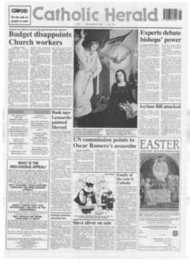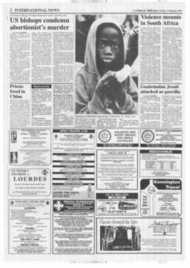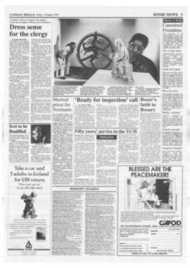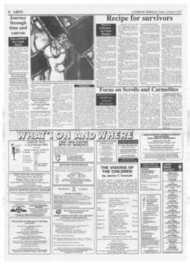Page 6, 19th March 1993
Page 6
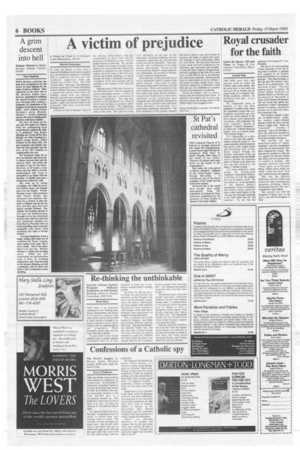
Report an error
Noticed an error on this page?If you've noticed an error in this article please click here to report it.
Tags
Share
Related articles
Gay Rights Priest In London
Cardinal Tries To Halt Unauthorised Soho Gay Masses
Us Priest Praises All Love
Who Are Heroes And Who Victims?
Letters To The Editor
A victim of prejudice A Priest on Trial by Fr Bernard Lynch (Bloomsbury, £16.99) Martin Pendergast
IN 1984, the Mayor of New York's proposal forbidding discrimination against gays and lesbians by employers contracted with or funded by the City met with vociferous opposition from the Archdiocese of New York. The 1992 Vatican letter "allowing" discriminatory practices on the part of Church institutions towards lesbians and gays, occasioned by a request for advice from some US bishops, shows little has changed. However, over the years, grassroots voices have been heard speaking up loudly for people's rights and pastoral needs to be respected. One such voice has been Bernard Lynch.
A Priest on Trial is Bernard's story of his ministry with lesbian and gay communities in New York and his growing involvement in Aids work as people became ill and died. We see how the conflicts of a young missionary priest, trained for a post-Conciliar Church but expected to minister in a pre-Vatican H context, led to his move to the USA from Ireland and Zambia. Running as a thread through the book is Bernard's emerging acceptance of his own sexuality and its meaning in the context of his faith and ministry.
Although much of the book focuses on his 1989 trial in New York on trumped-up sexual molestation charges, A Priest on Trial is more than just a celebration of Bernard's innocence. The saga that unfolds is an indictment of a Church which gives primacy to juridical rather than pastoral criteria. The frightening events described are a scandal in every sense of the word. The "get him at any cost" mentality on the part of the authorities, including saddening Church complicity, meant that not only Bernard Lynch was seen as expendable. There was too, the cruel victimisation of his main accuser, John Schaefer. No one can fail to be moved by Schaefer's deep loneliness and vulnerability, nor touched by Bernard Lynch's refusal to condemn him.
Given the laws of libel, the book has to rest on information which is clearly in the public domain. This leads to some frustrating loose ends as the story nears its conclusion. With such limitations the book might have been more satisfying if it had ended with Judge Burton Roberts' unequivocal declaration of Bernard's innocence as the prosecution case collapsed and John Schaefer declined to testify. As it is, we have some reflections about Bernard's involvement in a particularly significant relationship. The brief poignancy of this passage suggests
that there is more to say, not in terms of exposure, but rather to explore the nature and meaning of such relationships within the priesthood. Having heard Bernard Lynch speak and been inspired by his reflections upon spirituality and sexuality, I found the final chapters disappointing. Bernard's epilogue in the form of an open letter to John Paul H sits as an awkward and unnecessary appendix. Having got the story to some extent out of his system, 1 had hoped we might benefit.from a more coherent expression of Bernard's solid faith and joy, his celebration of sexuality as well as his experience of suffering.
Given the subject, this is a brave, honest and non-sensationalist book. It needed to be written lest we have any illusions about the human face of the Church many of us struggle to love.
Martin Pendergast is convenor of Catholic Aids Link
blog comments powered by Disqus


